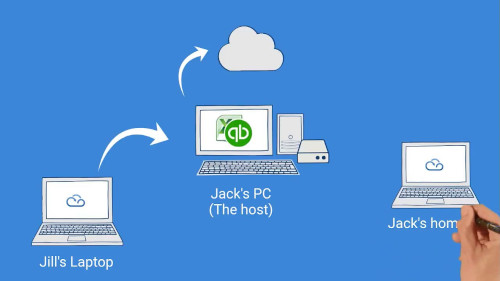Everywhere you look, “remote work” is a hot topic. Technological advancements and a changing workforce have both fostered the shift towards distributed teams. Globally, 70% of professionals work outside the office at least once a week. What was once a privilege has become a new normal.
When you think of getting to work from home, it’s hard to think of a downside, right? Well, there honestly aren’t that many. But the benefits run deeper than working in a leisurely environment. The demand for a flexible work space is growing because it works.
If you’re curious about the perks of remote working, we’ve compiled some of the most common incentives.
Boosts Productivity
It may surprise you, but multiple surveys and studies have shown that those who work from home are more productive than their office-bound counterparts. Remote employees, on average, have better performance and work more hours than office employees. There are several reasons this may be the case.
Office environments aren’t always conducive to working effectively. Moreover, it’s been proven that open work spaces impair concentration. Sharing a large space with dozens of people, there is no privacy and you are regularly subject to micromanaging or interruptions. Many companies opt for this environment to encourage collaboration, but it often leads to the opposite. It has proven to be ineffective.
Moreover, the freedom to customize your work space and schedule can amplify productivity. If you have more energy at night or focus better with music on, you can cater to those preferences and get your best work done. As individuals, we all have work styles that keep us on task. 86% of professionals in one survey reported that choosing their schedule boosts productivity.
Saves Money
Working on-premise isn’t cheap: roughly $4,000/year is spoken for when you work from the office. The main culprits are related to transportation – gas money, car maintenance, bus or train fare, Uber rides, and parking fees. Another series of small expenses that add up are buying food and drinks. While it may save you time to not prepare meals at home at bring them to work, it is leeching your paycheck.
When you work remotely, that money is freed up for you. How would you spend the thousands of spare dollars per year?
Among developed countries surveyed, ½ of middle-class households report difficulty saving money and making ends meet. Improving financial health is a luxury remote work may provide. Saving for emergency funds, retirement, and getting out of student and healthcare debt are important to financial freedom.
However, some fun expenses don’t hurt. If you’ve dreamed of being able to take more vacation time but felt chained to your office, you might try a “workcation”.
Reduces Stress
Many of the most common stressors surrounding employment are mitigated by spending less time in the office.
A significant source of work-related stress is commuting. The negative impact of lengthy, stressful commutes has been well-documented. Over 30% of men and women surveyed with a commute exceeding 90 minutes per day had psychosomatic symptoms serious enough to warrant medical care. Exhaustion, dizziness, pain, and sleep deprivation are a few of the physical side effects of chronic stress.
Workplace stress from in-office conditions and interactions is another pervasive issue. 94% of American workers experienced stress at their office. Many of these workers reported high stress levels from various causes – among them are their boss, leadership changes, inefficient communication within their company, and unnecessarily high workloads. Oftentimes, the stress is so great that employees are willing to quit their jobs because they feel there is no recourse.
Untreated stress is an immense mental, physical, and financial burden. And workplace stress doesn’t just end at the office; it follows employees home. With burnout and stress-induced health conditions on the rise, switching to remote work may be a healthier alternative for the struggling workforce.
Improves Well-being
Reducing stress is only one side of the coin; improving physical and mental health is more than just damage control. The time and money remote employees are saving in their jobs provides the freedom to devote them to their well-being. Unfortunately, when working in an office, many employees report other areas of their lives suffering as a result of lacking energy or resources.
When you have autonomy over your hours, that opens up a lot of possibilities for how you spend the rest of your time. Flexibility allows for more efficient working with less time spent – which gives you more energy to spend on valuable measures of self-care. Read a book, go to the gym, or even take up a side hustle. In addition, decreased strain and time at work can help parents balance their family and their career more easily, which can also save a significant amount of money on childcare.
The various benefits of remote working have a domino effect, which results in happier and more effective employees.
Of course, office-optional professionals can also fall victim to stress and reduced well-being. Loneliness and the struggle for work/life balance are the two main pitfalls. But with positive work habits and a team that supports their remote employees, these risks can be mitigated.
Provides Accessibility
Many people work remotely to take advantage of the perks, but for others, it is a necessity. In a comprehensive study of freelancers, 1 in 5 cannot work in traditional environments due to health issues. Working from home affords this population the chance for gainful employment.
Workplace accommodations for disabled employees are required by law in many countries, but remote work confers further benefits. Some are unable to perform part or all of their job responsibilities successfully. In addition, the flexibility of remote work can make it easier to pace oneself or set aside extra days for medical appointment. Thankfully, the growing demand for remote work has allowed for telework to be considered a reasonable accommodation.
In addition to the disabled, these benefits of remote work apply to veterans and the senior population.
What About Employers?
Employees aren’t the only ones reaping the benefits of a flexible workspace. The bottom line of a good business model is that the dynamic is effective and results in a net gain. Fortunately, remote work is an enormous advantage for companies.
6 out of 10 employers recognize the numerous ways it saves money for a business as an obvious benefit. A company can save $10,000 per employee on real estate expenses each year by switching to a distributed team. Not only would real estate costs lower, but the necessity for office supplies and equipment would lower.
More than the practical savings on the premise itself, a remote team can save money on a personnel level. A stressed workforce is expensive. In the U.S., over $300 billion is lost annually due to occupational stress. This combines absences, employee turnover, accidents, healthcare costs, and hits to productivity.
A distributed team is a more stable team. Based on the clear benefits to employees, it makes sense that off-site workers have increased morale and company loyalty. The key is to keep the team unified by developing a structure that supports each moving part and find effective ways of communication, which will heavily rely on technology.





